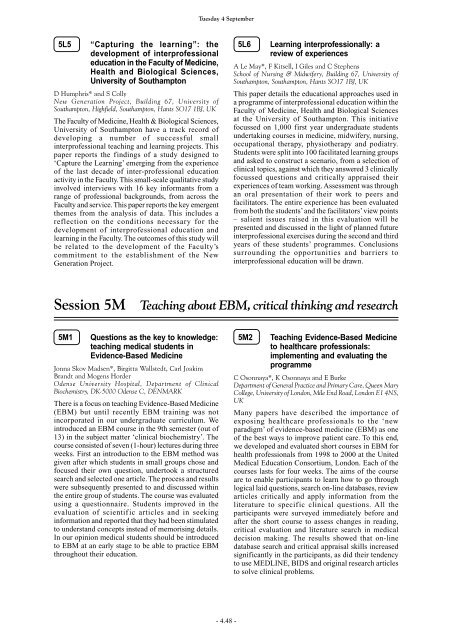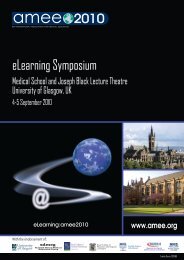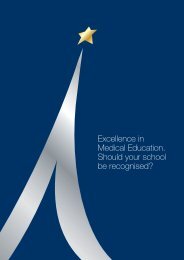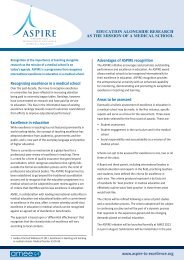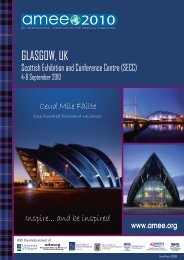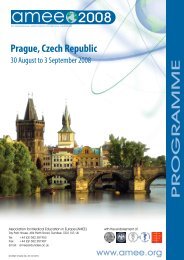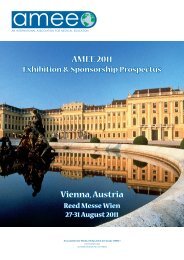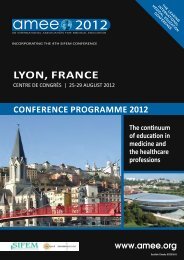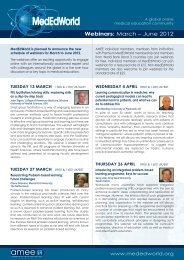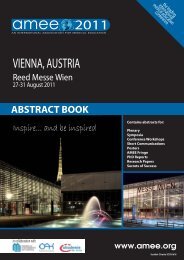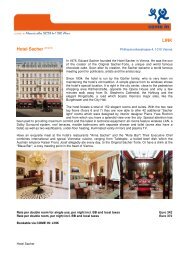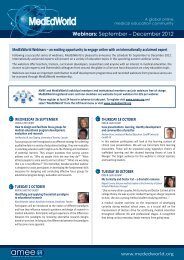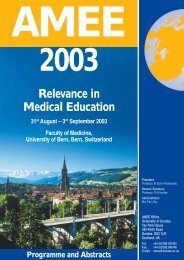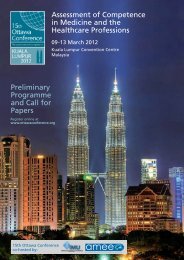AMEE Berlin 2002 Programme
AMEE Berlin 2002 Programme
AMEE Berlin 2002 Programme
You also want an ePaper? Increase the reach of your titles
YUMPU automatically turns print PDFs into web optimized ePapers that Google loves.
5L5 “Capturing the learning”: the<br />
development of interprofessional<br />
education in the Faculty of Medicine,<br />
Health and Biological Sciences,<br />
University of Southampton<br />
D Humphris* and S Colly<br />
New Generation Project, Building 67, University of<br />
Southampton, Highfield, Southampton, Hants SO17 1BJ, UK<br />
The Faculty of Medicine, Health & Biological Sciences,<br />
University of Southampton have a track record of<br />
developing a number of successful small<br />
interprofessional teaching and learning projects. This<br />
paper reports the findings of a study designed to<br />
‘Capture the Learning’ emerging from the experience<br />
of the last decade of inter-professional education<br />
activity in the Faculty. This small-scale qualitative study<br />
involved interviews with 16 key informants from a<br />
range of professional backgrounds, from across the<br />
Faculty and service. This paper reports the key emergent<br />
themes from the analysis of data. This includes a<br />
reflection on the conditions necessary for the<br />
development of interprofessional education and<br />
learning in the Faculty. The outcomes of this study will<br />
be related to the development of the Faculty’s<br />
commitment to the establishment of the New<br />
Generation Project.<br />
- 4.48 -<br />
5L6 Learning interprofessionally: a<br />
review of experiences<br />
A Le May*, F Kitsell, I Giles and C Stephens<br />
School of Nursing & Midwifery, Building 67, University of<br />
Southampton, Southampton, Hants SO17 1BJ, UK<br />
This paper details the educational approaches used in<br />
a programme of interprofessional education within the<br />
Faculty of Medicine, Health and Biological Sciences<br />
at the University of Southampton. This initiative<br />
focussed on 1,000 first year undergraduate students<br />
undertaking courses in medicine, midwifery, nursing,<br />
occupational therapy, physiotherapy and podiatry.<br />
Students were split into 100 facilitated learning groups<br />
and asked to construct a scenario, from a selection of<br />
clinical topics, against which they answered 3 clinically<br />
focussed questions and critically appraised their<br />
experiences of team working. Assessment was through<br />
an oral presentation of their work to peers and<br />
facilitators. The entire experience has been evaluated<br />
from both the students’ and the facilitators’ view points<br />
– salient issues raised in this evaluation will be<br />
presented and discussed in the light of planned future<br />
interprofessional exercises during the second and third<br />
years of these students’ programmes. Conclusions<br />
surrounding the opportunities and barriers to<br />
interprofessional education will be drawn.<br />
Session 5M Teaching about EBM, critical thinking and research<br />
5M1 Questions as the key to knowledge:<br />
teaching medical students in<br />
Evidence-Based Medicine<br />
Jonna Skov Madsen*, Birgitta Wallstedt, Carl Joakim<br />
Brandt and Mogens Horder<br />
Odense University Hospital, Department of Clinical<br />
Biochemistry, DK-5000 Odense C, DENMARK<br />
There is a focus on teaching Evidence-Based Medicine<br />
(EBM) but until recently EBM training was not<br />
incorporated in our undergraduate curriculum. We<br />
introduced an EBM course in the 9th semester (out of<br />
13) in the subject matter ‘clinical biochemistry’. The<br />
course consisted of seven (1-hour) lectures during three<br />
weeks. First an introduction to the EBM method was<br />
given after which students in small groups chose and<br />
focused their own question, undertook a structured<br />
search and selected one article. The process and results<br />
were subsequently presented to and discussed within<br />
the entire group of students. The course was evaluated<br />
using a questionnaire. Students improved in the<br />
evaluation of scientific articles and in seeking<br />
information and reported that they had been stimulated<br />
to understand concepts instead of memorising details.<br />
In our opinion medical students should be introduced<br />
to EBM at an early stage to be able to practice EBM<br />
throughout their education.<br />
Tuesday 4 September<br />
5M2 Teaching Evidence-Based Medicine<br />
to healthcare professionals:<br />
implementing and evaluating the<br />
programme<br />
C Osonnaya*, K Osonnaya and E Burke<br />
Department of General Practice and Primary Care, Queen Mary<br />
College, University of London, Mile End Road, London E1 4NS,<br />
UK<br />
Many papers have described the importance of<br />
exposing healthcare professionals to the ‘new<br />
paradigm’ of evidence-based medicine (EBM) as one<br />
of the best ways to improve patient care. To this end,<br />
we developed and evaluated short courses in EBM for<br />
health professionals from 1998 to 2000 at the United<br />
Medical Education Consortium, London. Each of the<br />
courses lasts for four weeks. The aims of the course<br />
are to enable participants to learn how to go through<br />
logical laid questions, search on-line databases, review<br />
articles critically and apply information from the<br />
literature to specific clinical questions. All the<br />
participants were surveyed immediately before and<br />
after the short course to assess changes in reading,<br />
critical evaluation and literature search in medical<br />
decision making. The results showed that on-line<br />
database search and critical appraisal skills increased<br />
significantly in the participants, as did their tendency<br />
to use MEDLINE, BIDS and original research articles<br />
to solve clinical problems.


